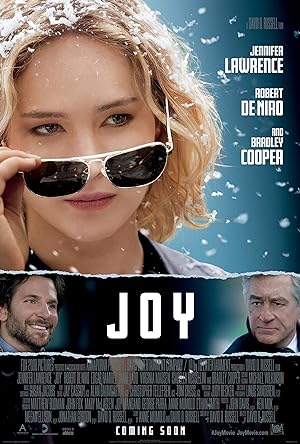Joy is a movie about a single mother with the weight of her entire family on her shoulders who rediscovers her younger, true self as an inventor and embraces that identity in a struggle to survive and eventually thrive. David O. Russell directed Joy, Silver Linings Playbook and American Hustle. Unsurprisingly Joy stars Jennifer Lawrence, whom I usually love, but I kept thinking that Joy needed a time machine and needs a young Gena Rowlands. Or maybe it just needed Gena Rowlands now as her mother, grandmother, neighbor, etc.
Joy felt like two different movies: a surreal biopic and a gangster film. Joy is a tonally strange movie. There are oneiric and surrealistic elements early in the film that abruptly stop after the first third. Joy felt less like a biopic and more like all the characters were externalized personifications or manifestations of Joy’s subconscious that she had to eliminate one by one to become who she was meant to be.
Joy, the film, starts in an extremely chaotic environment and is shot claustrophobically with extreme close ups of characters, but by the end of the film, Joy is calmly seated in her own space like The Godfather. This part of the story resonated with me because it is not unusual for caretakers, predominantly women, to take on more responsibility than they should while sacrificing parts of themselves in exchange for survival. When she finally starts to emerge as herself, her efforts are belittled and undermined by those who are trying to secure their continued dependency and imagined superiority while accomplishing little themselves and undermining the only security they have.
Joy suddenly shifts into a shakedown gangster movie after she achieves some success. Early in Joy, when Isabella Rosselini asks her what Joy should do with the gun, the question becomes literal in one scene and in a plot twist when Joy’s hard work is threatened. Frankly Joy as a film becomes a bit ridiculous as the titular character threw on a leather jacket and donned sunglasses to face down her opponents. Even Katniss Everdeen would roll deep into that meeting, not go alone.
After I watched Joy, I did a little research to separate fact from fiction. The ex husband was not a Venezuelan failed lounge singer, but a business classmate. I had thoughts on why Russell invented these characters, but it is hard to articulate. Russell definitely was aiming for an America as melting pot that benefits from the energy of people from different ethnicities and changing the husband’s career enhances that exotic quality and enhances the romantic angle in the film.
The sister, played by Elisabeth Rohm, an Angel and Law & Order alum, never existed, and her mother was not an agoraphobic. These inventions enforce stereotypes of women. There is literally no sisterhood, just competition and undermining. If you want to cure madness, just get someone a man. My interpretation can obviously be wrong, but I work with what I’m given.
Joy was too odd to find enjoyable. My mom loves Shark Tank and any rags to riches film, but when she actually started watching Joy, she kept demanding, “Why would you think that I wanted to watch this film!?!” As a fictional biopic, Joy does not work, but as a Fellini-esque take on rags to riches stories with a dash of Coppola, Joy is an ambitious failure. Either way, I found it too dissonant to enjoy it and would only recommend Joy to hard core Russell, Lawrence, Bradley Cooper or Robert DeNiro fans.
Stay In The Know
Join my mailing list to get updates about recent reviews, upcoming speaking engagements, and film news.




